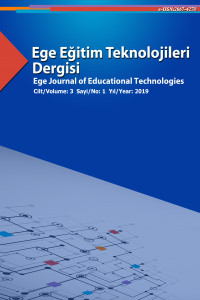Öz
Kaynakça
- ABET (2013). Accreditation criteria for engineering programs. Student outcomes.http://www.abet.org/eac-criteria-2014-2015/ Son erişim tarihi 20.05.2019
- Budimac, Z., Putnik, Z., Ivanović, M., Bothe, K., & Schuetzler, K. (2011). On the assessment and self-assessment in a students teamwork based course on software engineering. Computer Applications in Engineering Education, 19(1), 1-9.
- Chen, J., Qiu, G., Yuan, L., Zhang, L., & Lu, G. (2011). Assessing teamwork performance in software engineering education: A case in a software engineering undergraduate course. In Software Engineering Conference (APSEC), 2011 18th Asia Pacific (pp. 17-24). IEEE.
- Dringenberg, E., & Purzer, Ş. (2018). Experiences of First-Year Engineering Students Working on Ill-Structured Problems in Teams. Journal of Engineering Education, 107(3), 442-467.
- Fidalgo-Blanco, Á., Sein-Echaluce, M. L., García-Peñalvo, F. J., & Conde, M. Á. (2015). Using Learning Analytics to improve teamwork assessment. Computers in Human Behavior, 47, 149-156.
- Fraenkel, J.R. & Wallen, N.E. (2006). How to Design and Evaluate Research in Education. Mc-Graw Hill: Boston.
- Greetham, M., & Ippolito, K. (2018). Instilling collaborative and reflective practice in engineers: using a team-based learning strategy to prepare students for working in project teams. Higher Education Pedagogies, 3(1), 510-521.
- Hassan, R., Yusof, N.H. and Salleh, S.M., (2011). Easy Electronic Software for digital Logic Design. In Universiti-Kebangsaan-Malaysia Teaching and Learning Congress.
- Lawlor, J., Conneely, C., Oldham, E., Marshall, K., & Tangney, B. (2018). Bridge21: teamwork, technology and learning. A pragmatic model for effective twenty-first-century team-based learning. Technology, Pedagogy and Education, 27(2), 211-232.
- Lingard, R. W. (2010a). Teaching and assessing teamwork skills in engineering and computer science. Journal of Systemics, Cybernetics and Informatics, 18(1), 34-37.
- Lingard, R. W. (2010b). Improving the teaching of teamwork skills in engineering and computer science. Systems, Cybernetics and Informatics, 8(6), 20-23.
- Macke, C., Taylor, J. A., Taylor, J. E., Tapp, K., & Canfield, J. (2015). Social work students’ perceptions of team-based learning. Journal of Teaching in Social Work, 35(5), 454-470.
- Splichal, J. M., Oshima, J., & Oshima, R. (2018). Regulation of collaboration in project-based learning mediated by CSCL scripting reflection. Computers & Education.
- Willey, K., & Freeman, M. (2006). Completing the learning cycle: The role of formative feedback when using self and peer assessment to improve teamwork and engagement. In AAEE-Annual Conference of Australasian Association for Engineering Education. School of Engineering, Auckland University of Technology, Auckland, New Zealand.
Öz
İş hayatında mühendislerin takım çalışması
yeteneklerinin yüksek olması beklendiğinden, öğrencilerin bu yeteneklere sahip olarak
mezun olmaları önem taşımaktadır. Bu nedenle, mühendislik eğitim programlarında
öğrencilere takım çalışması tecrübesi kazanacakları imkanlar sağlanmalıdır. Bu
çalışmada, bilgisayar mühendisliği öğrencilerinin takım çalışması yetenekleri
bir donanım dersinde bireysel ve akran değerlendirmeleri kullanılarak
incelenmiştir. Çalışma, Türkiye’deki bir devlet üniversitesinde 56 ikinci sınıf
öğrencisinin katılımı ile gerçekleştirilmiştir. Çalışmada, bireysel ve akran
değerlendirmeleri için kullanılan Takım Çalışması Değerlendirme Formu ile
toplanan nicel veriler incelenmiştir. Hem bireysel hem akran değerlendirme
bulguları, öğrencilerin yüksek düzeyde takım çalışması yetenekleri
kazandıklarını göstermiştir. Ayrıca, kazanılan takım çalışması yeteneklerinin
sayısının proje notları ile doğru orantılı olduğu gözlemlenmiştir.
Anahtar Kelimeler
Takım çalışması Bireysel değerlendirme Akran değerlendirmesi Bilgisayar mühendisliği eğitimi
Kaynakça
- ABET (2013). Accreditation criteria for engineering programs. Student outcomes.http://www.abet.org/eac-criteria-2014-2015/ Son erişim tarihi 20.05.2019
- Budimac, Z., Putnik, Z., Ivanović, M., Bothe, K., & Schuetzler, K. (2011). On the assessment and self-assessment in a students teamwork based course on software engineering. Computer Applications in Engineering Education, 19(1), 1-9.
- Chen, J., Qiu, G., Yuan, L., Zhang, L., & Lu, G. (2011). Assessing teamwork performance in software engineering education: A case in a software engineering undergraduate course. In Software Engineering Conference (APSEC), 2011 18th Asia Pacific (pp. 17-24). IEEE.
- Dringenberg, E., & Purzer, Ş. (2018). Experiences of First-Year Engineering Students Working on Ill-Structured Problems in Teams. Journal of Engineering Education, 107(3), 442-467.
- Fidalgo-Blanco, Á., Sein-Echaluce, M. L., García-Peñalvo, F. J., & Conde, M. Á. (2015). Using Learning Analytics to improve teamwork assessment. Computers in Human Behavior, 47, 149-156.
- Fraenkel, J.R. & Wallen, N.E. (2006). How to Design and Evaluate Research in Education. Mc-Graw Hill: Boston.
- Greetham, M., & Ippolito, K. (2018). Instilling collaborative and reflective practice in engineers: using a team-based learning strategy to prepare students for working in project teams. Higher Education Pedagogies, 3(1), 510-521.
- Hassan, R., Yusof, N.H. and Salleh, S.M., (2011). Easy Electronic Software for digital Logic Design. In Universiti-Kebangsaan-Malaysia Teaching and Learning Congress.
- Lawlor, J., Conneely, C., Oldham, E., Marshall, K., & Tangney, B. (2018). Bridge21: teamwork, technology and learning. A pragmatic model for effective twenty-first-century team-based learning. Technology, Pedagogy and Education, 27(2), 211-232.
- Lingard, R. W. (2010a). Teaching and assessing teamwork skills in engineering and computer science. Journal of Systemics, Cybernetics and Informatics, 18(1), 34-37.
- Lingard, R. W. (2010b). Improving the teaching of teamwork skills in engineering and computer science. Systems, Cybernetics and Informatics, 8(6), 20-23.
- Macke, C., Taylor, J. A., Taylor, J. E., Tapp, K., & Canfield, J. (2015). Social work students’ perceptions of team-based learning. Journal of Teaching in Social Work, 35(5), 454-470.
- Splichal, J. M., Oshima, J., & Oshima, R. (2018). Regulation of collaboration in project-based learning mediated by CSCL scripting reflection. Computers & Education.
- Willey, K., & Freeman, M. (2006). Completing the learning cycle: The role of formative feedback when using self and peer assessment to improve teamwork and engagement. In AAEE-Annual Conference of Australasian Association for Engineering Education. School of Engineering, Auckland University of Technology, Auckland, New Zealand.
Ayrıntılar
| Birincil Dil | Türkçe |
|---|---|
| Bölüm | Derlemeler |
| Yazarlar | |
| Yayımlanma Tarihi | 30 Haziran 2019 |
| Gönderilme Tarihi | 30 Mayıs 2019 |
| Yayımlandığı Sayı | Yıl 2019 Cilt: 3 Sayı: 1 |
Index Copernicus, Asos Index, WorldCat, OpenAIRE, ROAD, BASE, Google Scholar, Academia.edu, Türk Eğitim İndeksi, IAD, EuroPub, Academindex
tarafından taranmaktadır.
Publisher
İzmir Akademi Derneği
www.izmirakademi.org
Dergi Ana Sayfası | Amaç & Kapsam | Yazar Rehberi | Politikalar | İndeksler | Kurullar | İletişim



